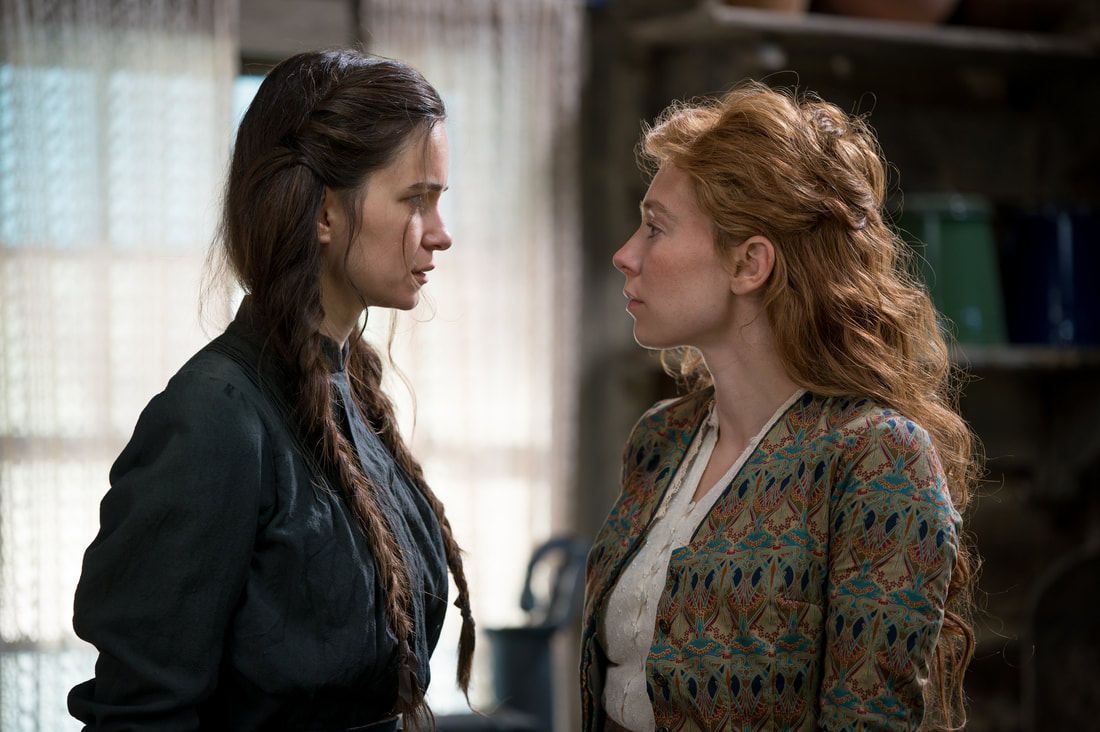|
Katherine Waterston and Vanessa Kirby in The World to Come (2021) O sick and miserable heart be still. Katherine Waterston and Vanessa Kirby weather the storm in Mona Fastvold’s The World to Come, a nineteenth-century frontier romance of quiet passion and debilitating tragedy. So much of Fastvold’s strength as a storyteller exists in the way she establishes mood through imagery. A chilly opening scene on an isolated farm introduces Abigail (Waterston), who writes beautiful thoughts and narrates her inner turmoil while keeping up with all the responsibilities assumed of her. Having recently lost their daughter to diphtheria, Abigail and her husband Dyer (Casey Affleck, who frustratingly still gets employed) lead separate lives. While he works on their farm, she keeps the household together and finds no source of calm in imagining a better world to come. Her daughter was a light in her life; there is a visible warmness on screen when the mother-daughter memories are depicted. Abigail has become her grief, a portrait of loneliness that doesn’t see the light of day until the arrival of a new possibility…another way of life that enchants Abigail at first sight. Tallie (Kirby) and her farmer husband Finney (Christopher Abbott) move into a neighboring farm, opening Abigail’s mind to a place where she can imagine a better existence.
One afternoon, Tallie takes a hilly walk towards Abigail’s farm and makes a neighborly introduction. Meeting her makes Abigail’s day, and the rest is history. One visit turns into many, where the two simply talk and learn more intimate details about each other. Over the course of changing seasons, they discover how little time they wish to spend apart as their romance blossoms, but all is not well on the frontier. Co-written by Ron Hansen and Jim Shepard, based upon Shepard’s original story titled as the film is, the screenplay often moves in circles following the protagonists’ increasing despair as the men in their lives annoyingly get in the way. Seeing their wives out for hours at a time, not keeping up with household and marital responsibilities, Dyer and (to a more angering extent) Finney consider Abigail and Tallie’s relationship a threat. While admirably poetic and mostly well acted, The World to Come falls flat more often than not. With two intriguing characters at the center and a variety of arcs to explore within them, not to mention two supremely talented actresses playing the parts, it is disappointing that the screenplay focuses so intently on the woefulness surrounding them. An arc seen often in lesbian romance films, where the love story builds up to crumble in heartache, shifts focus away from fully exploring the intimacy between the protagonists. Short but quietly resonating moments, like Tallie bringing Abigail a birthday basket of sentimental gifts, are just that. A fleeting depiction of a meaningful relationship in favor of servicing a familiar arc. The story feels more complete showing the weight of their love in the final few scenes alone than during the entire course of the film. This is to no fault of the performances, but rather the narrative focus on the tragedy that their bond crumbles towards. Waterston and Kirby shine wonderfully together; Abigail’s inward tendencies and Tallie’s more quickened, spirited manner are an intriguing dynamic. Both of these characters are working through the emotional and physical challenges of loneliness, which are depressing to watch unfold amongst the intimate world they have cultivated for themselves. The film also touches on some resonating themes including the notion around ‘the best is yet to come.’ When the protagonists meet, it’s as if the world opens up again. Abigail’s yearning for a more interesting life than the one she leads, and her surprise at life being more ordinary than she imagined, gives a strong window into her character. It’s a treat to watch how Tallie recognizes this desire so lovingly, and encourages imagination. But these insights into the characters are few and far between, not enough to carry this film while a far less interesting (and far more tragic) narrative gets in the way. While the story leaves a lot to be desired, there are some strong elements to admire in addition to great central performances. In her second directorial feature to date, Mona Fastvold shows plenty of promise particularly through establishing the mood of a scene and expressing emotion through imagery. One of the most memorable moments in the film sees Abigail in an almost euphoric state, leaning back onto a table and relishing a moment she had shared with Tallie earlier. Unfortunately such resonating scenes exist in bits and pieces. Weathering the harsh winter, blossoming spring and summer are two protagonists whose relationship feels incredibly true, but exists in an incomplete story with a tiring arc. While The World to Come shines through strong central performances and stunning cinematography, the progression of Fastvold’s nineteenth-century love story falls flat with only glimmers of promise moving the film along.
0 Comments
Leave a Reply. |
Archives
June 2024
Categories |


 RSS Feed
RSS Feed